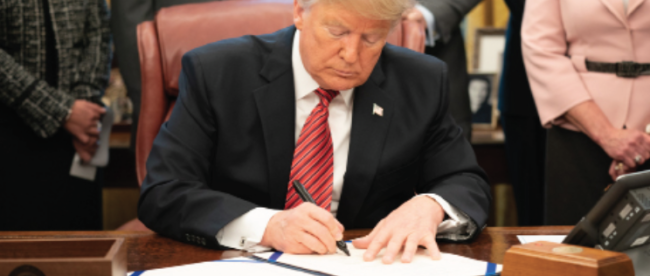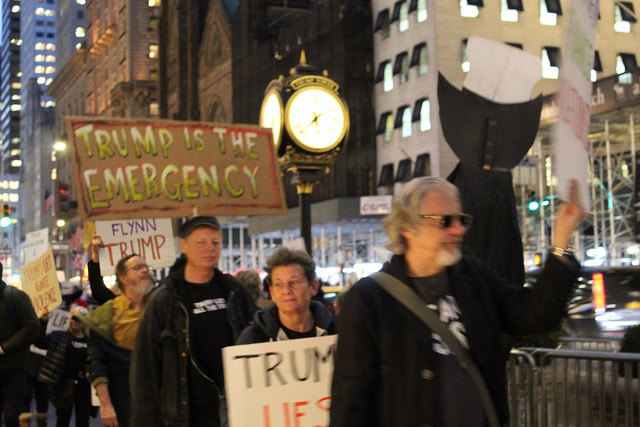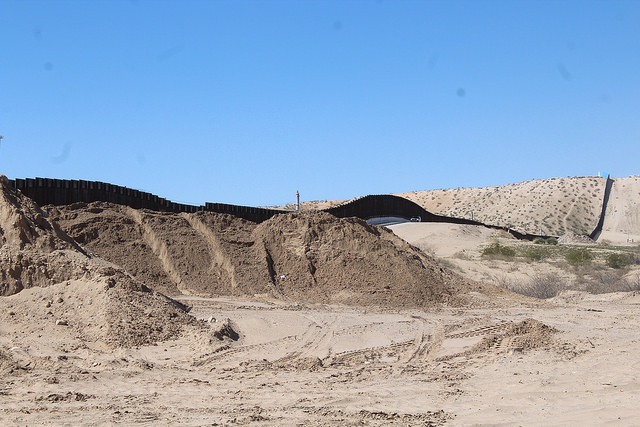The border fence travels the length of El Paso, Texas,. President Trump wants a similar structure across the entire southern border. Photo by Cassidy Morrison
President Trump’s national emergency continues as Congress failed to override his first veto yesterday, allowing him to pursue funds for his long-promised border wall.
Opponents believe Trump is abusing presidential emergency powers and that he is not acting in the interests of border security, but working to further his own interests. Multiple lawsuits have been filed against funding the border wall.
“National emergencies were designed for use in a democracy and didn’t foresee someone like Trump of authoritarian tendencies,” said Ruth Ben-Ghiat, NYU professor of Italian and History.
She is also a political commentator on authoritarian leadership, fascism, propaganda, and threats to democracy. “The broad frame of this is that there just isn’t a national emergency provision for the highest leader and it can open itself up to abuse.”
When a president declares a national emergency, they can access a range of emergency powers, which can over cover almost every imaginable subject area. After the Watergate scandal, Congress wanted to limit these powers and enacted the National Emergency Act of 1976. This act was meant to give lawmakers a way to check presidential powers. However, Anthony Boyle, Counsel at the Brennan Center for Justice at NYU Law School, thinks that the act isn’t enough.
“You’ve seen that even with the passing of a resolution to terminate the national emergency by both the Senate and the House, the emergency is able to continue because the president can veto it,” said Boyle. “So, there aren’t enough checks on the president’s ability to use emergency powers right now.”

License by Creative Commons President Donald Trump declare a national emergency to get funding for a wall at the US/Mexico border.
The Brennan Center for Justice, a non-partisan public policy and law institute, is pushing lawmakers to reform the National Emergency Act to prevent what they believe is the abuse of emergency powers by the Presiden.t Trump.
Some of these reforms include only having the emergency last 30 or 60 days under the president’s declaration, instead of a year, and then having Congress determine whether or not to renew it. They would also like to have more of a description of what constitutes a “true” national emergency so presidents can’t just say anything is an emergency. The hope is that these reforms would prevent those in office from circumventing the checks and balances of the American government.
“The way that he’s using emergency powers to circumvent Congress. The way that he essentially admits that he didn’t have to use emergency powers. All of these things are norms that haven’t been transgressed in the past,” Boyle said. “I’m not going to say that emergency powers haven’t been misused ever in the past. It’s just President Trump is misusing them to a far greater degree than prior presidents.”
President Trump warned the public in January that he was considering using his emergency powers to build a wall along the southern border. He also admitted in February that he “didn’t need to do this.”
Ben-Ghiat also believes that President Trump is trying to bypass Congress by his declaration of a national emergency. She sees this as a sign of authoritarian tendencies.
“The issue is that so many authoritarians in the past have used the concept of a national emergency to consolidate their power,” she said. “He has made it very clear that he’s frustrated with having to obey norms in democracy.”
Although President Trump stated that he is concerned about national security and the “invasion” that he says is occurring at the border, Ben-Ghait believes this national emergency is not about security, but power.
“He wants to stop people of color from coming in. He once said he’d like to have immigration from Norway,” Ben-Ghiat said.“That border stuff is about racism and about his power. What it’s not about is national security.”

Protestors in front of the Trump Tower on February 5th to denounce President Trump threat of a national emergency to secure border funding. Photo by Caroline Aguirre
The American Civil Liberties Union filed a lawsuit on behalf of an environmental organization, the Sierra Club, against Trump’s emergency powers declaration.
“The main crux of our lawsuit is national emergencies should only be declared when there truly is some sort of threat to national security, to public health – some true emergency,” said Gloria Smith, Managing Attorney for the Sierra Club. “This is not a national emergency.”
For decades the Sierra Club has worked with communities along the border to protect parks and land.
“Many of our members are part of these communities and without any kind of planning and frankly no notice to these communities, this wall would literally cut people off from their land,” Smith said.
She said this wall would also prohibit wildlife like birds, mountain lions, and other species from crossing back and forth along the border.
The Sierra Club and California have raised the National Environmental Policy Act of 1970 as part of their case. NEPA requires federal agencies to analyze the environmental effects of their proposed projects.
“They need to prepare a report and provide alternatives to this project and come up with mitigation measures – ways to make it have less environmental impact,” Smith said. “Are there alternatives? Maybe we could just have drones instead of building a wall or cameras.”
Smith believes it’s a very important statute to consider it Trump wants to build a wall along the southern border.
“This administration is not interested in intelligent, informed decision-making and policies and programs that would actually help people,” she said. “This goes back to a campaign slogan from three years ago – ‘Build a wall’ that just makes no sense. So is this in the name of national security? Of course not.”


